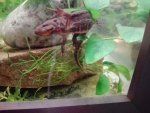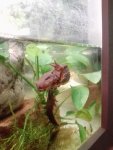loublue
Member
Hi, once again! For the last year I've had several problems with my newt but they all seemed to fix themselves after a while, including the ones I've written about in this forum. I believe she's around 22 years old now (can never be sure I guess).
Tried to search the forum but it's usually about newly bought newts that aren't eating.
Now she hasn't been eating for at least one week. She sits still on a plant almost all the time, very still. When I try to give her food she mostly seems bothered and swims away, the opposite of what she usually does when there's food.
It has gotten warmer but it's still not very warm where I live, and I've seen her in hot weather before and this is nothing like it. She's still always in the water so I believe the water is fine. She has live plants and from what I know there's nothing that stressed her out recently.
I know this is obviously not a good sign, the question is, is there anything I can do for her? I'm a little afraid to try and feed her with live food because she has had trouble swallowing and I always give her very small pieces of the frozen food she usually gets to make it easier for her.
Otherwise, any special food suggestions or anything else I can do for her?
Thank you
Tried to search the forum but it's usually about newly bought newts that aren't eating.
Now she hasn't been eating for at least one week. She sits still on a plant almost all the time, very still. When I try to give her food she mostly seems bothered and swims away, the opposite of what she usually does when there's food.
It has gotten warmer but it's still not very warm where I live, and I've seen her in hot weather before and this is nothing like it. She's still always in the water so I believe the water is fine. She has live plants and from what I know there's nothing that stressed her out recently.
I know this is obviously not a good sign, the question is, is there anything I can do for her? I'm a little afraid to try and feed her with live food because she has had trouble swallowing and I always give her very small pieces of the frozen food she usually gets to make it easier for her.
Otherwise, any special food suggestions or anything else I can do for her?
Thank you


